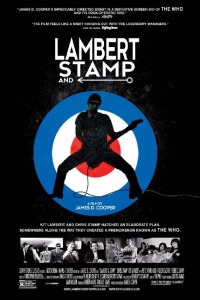Lambert & Stamp Review
 RYAN: I’m thrilled to be joined in this review by my dear friend Melinda Scott Krei – one of the most fun, exciting and thoroughly-educated people I’ve ever known. It’s an honor to have you join me on my site! We just saw Lambert & Stamp, a new documentary about The Who, but really about the two men who were roommates wanting to make a movie and ending up managing the impressive career of the rock band instead. There’s a life lesson in their story about things not going according to plan, yet still working out. I like that theme. I also want to confess up front, I’m not a fan of The Who. I worried this film would feature performance footage and I’d be bored, but you don’t need to be a fan to enjoy this doc.
RYAN: I’m thrilled to be joined in this review by my dear friend Melinda Scott Krei – one of the most fun, exciting and thoroughly-educated people I’ve ever known. It’s an honor to have you join me on my site! We just saw Lambert & Stamp, a new documentary about The Who, but really about the two men who were roommates wanting to make a movie and ending up managing the impressive career of the rock band instead. There’s a life lesson in their story about things not going according to plan, yet still working out. I like that theme. I also want to confess up front, I’m not a fan of The Who. I worried this film would feature performance footage and I’d be bored, but you don’t need to be a fan to enjoy this doc.
MELINDA: Thats quite true. You don’t have to be a fan to enjoy this movie. People could find interesting things in this film on a number of levels. For example, if you’re interested in the sociology of post-war England, or the way artistic community gets built, there are pieces of those in this film. I found it quite intriguing they way these two men found this band and the way they built a following for them. There’s an interesting psychological study, I think, about the music industry and the way they tried to mirror their fans in building that fan base.
RYAN: Lambert and Stamp seemed to be, more than anything else, tastemakers.
MELINDA: They were; and before we knew that term.
RYAN: They had great instincts because without any training, education in the arts, skills, experience, or even connections in the biz, they cultivated huge music artists. It’s also a sign of the times because their methods couldn’t work today. Now it’s about becoming a Vine or YouTube sensation. They created something in the sixties just by dumb luck and instinct.
MELINDA: They did a sort of crowdsourcing process, a different version at a different time.
RYAN: We were both also surprised to learn in this film that The Who owned Shepperton Studios.
MELINDA: True. And in fact, that reminds me… This is one of those movies where, at the end, I would have liked to have seen text about all this follow-up of where the people are now. When Kit Lambert died and if they still own…
RYAN: …yes it does inspire more interest and we’ve already googled some things and found, most importantly, that Chris Stamp also died prior to this film… in 2012 – but that wasn’t ever mentioned in or at the end of the movie. So odd!
MELINDA: it says something good about how intriguing the information is in the movie, that we cared enough to know more.
RYAN: Right and you just wonder whether The Who might have remained an obscure house band if Lambert and Stamp didn’t pluck them for their purposes.
MELINDA: The way the duo turned an obscure band into an international success story, really with no funding, was incredible. They pieced things together, finding money any way they could.
RYAN: The relationships are highlighted in the film; but technically, I was confused by some stylistic choices. Why some contemporary interviews were in color and others in black and white made no sense.
MELINDA: There were a couple of times where the interviewer’s voice was heard but almost imperceptible and not subtitled. And a couple times you’d even see his hair in the corner of the shot. Maybe that was meant to be cool, edgy-arty. It was unclear.
RYAN: It could just be lazy filmmaking. Ultimately we’re forgiving of those things because it’s still a good story. But critically looking at it, it is not slick.
MELINDA: I think they were trying to mimic a bit of the cinema of the time – mod-London-look. I think it may have all been intentional. I liked it very much. For anyone interested in that period or the music business would find this interesting. The emotional availability and vulnerability of the personalities profiled were touching at times.
RYAN: I liked it too. It’s a good documentary. Two full hours that move well and there’s much to appreciate in art and music history. It’s not a must see in the theater, but wouldn’t be a bad rental.

